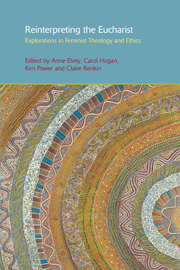Book contents
- Frontmatter
- Contents
- List of Illustrations
- Foreword
- Acknowledgements
- Contributors
- 1 Introduction
- 2 Eucharistic Metamorphosis: Changing Symbol, Changing Lives
- 3 The Sunday Eucharist: Embodying Christ in a Prophetic Act
- 4 How Australian Aboriginal Christian Womanist Tiddas (Sisters) Theologians Celebrate the Eucharist
- 5 Women, Eucharist, and Good News to All Creation in Mark
- 6 Rediscovering Forgotten Features: Scripture, Tradition and Whose Feet May Be Washed on Holy Thursday Night
- 7 Mystery Appropriated: Disembodied Eucharist and Meta-theology
- 8 Real Presence: Seeing, Touching, Tasting: Visualizing the Eucharist in Late Medieval Art
- 9 Embodying the Eucharist
- 10 Living One for the Other: Eucharistic Hospitality as Ecological Hospitality
- Subject Index
- Name Index
4 - How Australian Aboriginal Christian Womanist Tiddas (Sisters) Theologians Celebrate the Eucharist
- Frontmatter
- Contents
- List of Illustrations
- Foreword
- Acknowledgements
- Contributors
- 1 Introduction
- 2 Eucharistic Metamorphosis: Changing Symbol, Changing Lives
- 3 The Sunday Eucharist: Embodying Christ in a Prophetic Act
- 4 How Australian Aboriginal Christian Womanist Tiddas (Sisters) Theologians Celebrate the Eucharist
- 5 Women, Eucharist, and Good News to All Creation in Mark
- 6 Rediscovering Forgotten Features: Scripture, Tradition and Whose Feet May Be Washed on Holy Thursday Night
- 7 Mystery Appropriated: Disembodied Eucharist and Meta-theology
- 8 Real Presence: Seeing, Touching, Tasting: Visualizing the Eucharist in Late Medieval Art
- 9 Embodying the Eucharist
- 10 Living One for the Other: Eucharistic Hospitality as Ecological Hospitality
- Subject Index
- Name Index
Summary
It is vital that the existence and nature of the genetic, fundamental, racial ontology of our women is understood before there can be clear comprehension of our theologies/spiritualities. In this essay I will begin by covering this important aspect of our reality. I will then proceed to introduce the backgrounds of the women interviewees who will provide their perspective(s) on the Eucharist. The next stage will be to understand how, why and to what degree our women have become, and need to be, inculturation theologians in order to make Christianity relevant to their contexts. When our women become inculturation theologians, Christ and Christianity become transformed. For our women, who in their being are so at-one with the Land as natural Creation theologians, all is interconnected; Christ and Christianity, and thus, the Eucharist become embodied and embedded in the Land.
Racial Ontology and its Relevance to the Australian Indigenous Context
Before anyone can comprehend the theology of Australian Aboriginal Christian women, they must be able to perceive as best possible their racial ontology (which I define as ‘way of being in the world’). It is an ontology distinct from white Western ontology and is responsible, I believe, for our people's inability to assimilate. To help bring understanding to our human condition and struggle, I will explain the genetic foundation of our women's racial ontology.
Numerous works have been written on racial philosophy, but not specifically on racial ontology. A main objective of my research has been to provide one of the first Australian academic comprehensive works on racial ontology. This essay will explore the most important points of that research. The principal reason for doing this is to contribute to the reconciliation/healing process in this nation, concerning the Aboriginal and white Western relationship.
- Type
- Chapter
- Information
- Reinterpreting the EucharistExplorations in Feminist Theology and Ethics, pp. 54 - 77Publisher: Acumen PublishingPrint publication year: 2012



